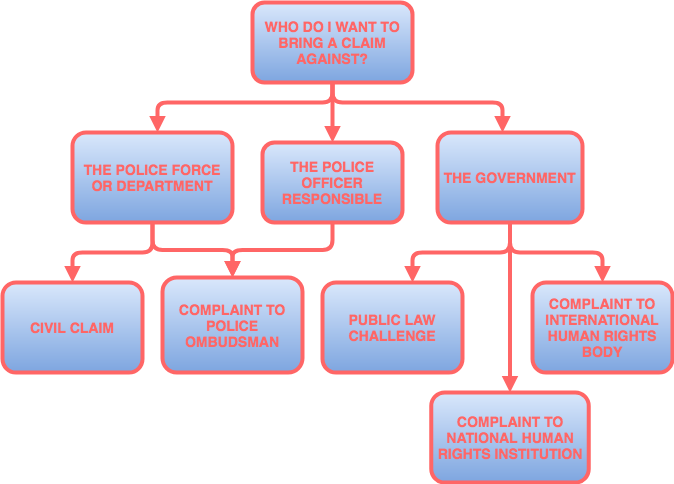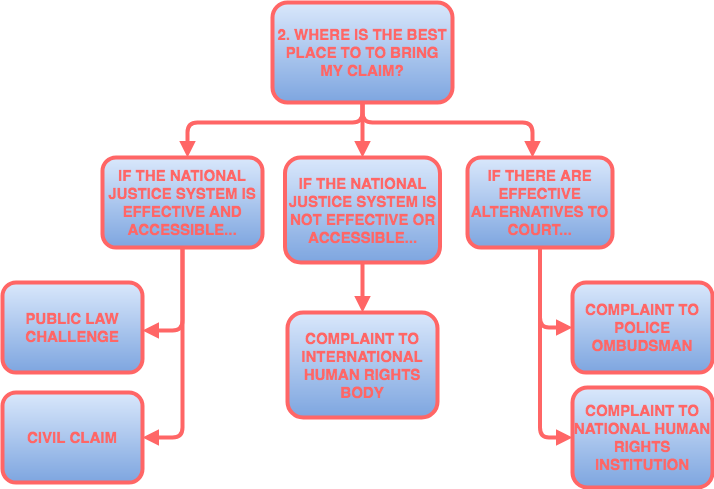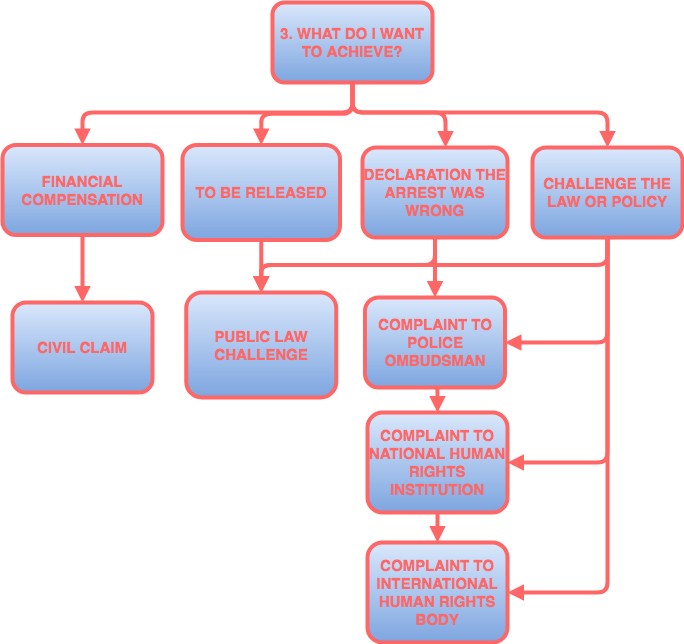What Legal Options do I Have to Challenge an Arrest?
If you believe you or someone in your community has been subject to an unlawful or arbitrary arrest, there may be options for you to challenge this using legal action.
This section of the guide outlines different ways you can enforce your rights and hold the relevant authority responsible for your arrest accountable if they violate your rights.
Can I Take Preventative Action to Stop an Arrest?
(a) Unexpected Arrests
The arrest could occur because of an unexpected meeting with police, a random stop and search or when an incident has occurred. These types of arrest can be difficult to prevent if the police have made their mind up.
It could help prevent an arrest by speaking to the police in a polite, clear and controlled way, taking care not to raise your voice or challenge the police unnecessarily.
Practical Tip: Know Your Rights
If you want to communicate effectively with the police, it can be helpful to make it clear that you know your rights. This can make any points you raise more effective and it could make the police less likely to act unlawfully.
Look at the rights and laws outlined in the section “What is an Unlawful or Arbitrary Arrest?” and then find the equivalent laws in your legal system.
Sometimes, it may be helpful to cooperate and answer police questions. If the police get the information they want and this does not implicate you in a crime, they may decide not to arrest you. However, remember that anything you say could be used against you in court. For that reason, it can be best to say nothing or say that you will not be answering any questions until you have a lawyer.
In general, you should not try to resist arrest or retaliate. This could escalate the situation and led to instances of police brutality or led to you being charged with a criminal offence for resisting an arrest. However, if you believe arrest could put your life at risk, attempting to escape or resist may be the only option available.
(b) Expected Arrests
If you have information to believe there is a risk that you or someone in your community will be unlawfully or arbitrarily arrested, there may be options for legal action available to you. For example, you may know there is a risk you will be arrested because a warrant has been issued for your arrest or because you have been threatened by police of arrest.
In these cases, you may be able to take legal action to seek an injunction or preventative measures if the arrest would be a clear violation of your rights.
Example: Precautionary Measures at the Inter-American Court of Human Rights
The IACtHR can issue precautionary measures to order a state not to continue with an action if it would cause a serious and irreparable harm to the person involved. Other regional human rights court have similar mechanisms.
Check if there is a similar procedure in your national court.
Can I Enforce My Rights within the Criminal Justice Process?
Criminal proceedings may be brought against you if you are believed to have committed a criminal offence. Generally, the standard of proof required to convict under criminal law is higher than under civil law and the accused will be presumed to be innocent until they are proved to be guilty.
If you have been arrested and criminal proceedings are ongoing against you and you believe you have been subject to an unlawful or arbitrary arrest, there may be ways this can be raised in the process of the criminal proceedings.
(a) Arrest without Grounds
If an arrest is made without grounds, you could challenge the arrest informally at the point of arrest and/or when brought to the police station to secure your release.
- Ask the police to tell you the reasons for your arrest to ascertain their grounds.
- There will often be a different police officer at the police station and they may have the responsibility to review the lawfulness of your arrest. Put your reasons to this officer as to why your arrest was unlawful.
- If you have an interview at the police station, put your case to the police that there are no grounds for your arrest.
- However, if you believe there could be a safety risk if you challenge the police in this way, get a representative to do so on your behalf.
Your account could influence the police not to charge you or bring you before a judge. If the police do not charge you then you should be released (this applies to those countries where it is the responsibility of the police to charge).
- For more information, see the Detention Guide under “Have You Been Detained Without Charge?”.
If you are charged with an offence, then your only recourse is within the criminal proceedings.
- There could be an opportunity for you to apply for the case to be dismissed before you get to the final trial if there are clearly no grounds.
- Otherwise, you may have to put forward your defence at trial being that you did not commit the crime.
(b) Arrest in Breach of Procedural Safeguards
If you are arrested and there are procedural errors, you could ask for these to be remedied informally at the point of arrest and/or when brought to the police station to secure your release. Thus, for example:
- Ask the police to tell you the reasons for your arrest to ascertain their grounds.
- There will often be a different police officer at the police station who may have a responsibility to review the lawfulness of your arrest. Outline the issues and your rights to this officer (e.g. that you have a right to access a legal representative).
If there are procedural errors, these will usually not automatically invalidate proceedings brought against you. However, if you can show that there were breaches of procedural safeguards, it could make certain evidence inadmissible. This means that certain evidence of the prosecution would not be able to be presented before the court.
- For example, if you were not told the reason you were arrested, anything said when you were arrested could be inadmissible (this will depend upon the law in your country).
(c) Apply for Bail
Bail is one of the most common ways to secure temporary release after you have been arrested. For more information on bail, see the A4J Detention Guide.
If you think there is scope to enforce any of your rights set out in this guide during criminal proceedings brought against you, you should discuss this with a lawyer. They will know the rules of criminal procedure in your country and when it would be appropriate to raise these issues in criminal proceedings.
How Can I Take Legal Action after I Have Been Arrested?
There are often a number of options available to challenge an arrest through legal action outside the criminal justice process. These include:
- Complaints to an independent body such as an “Ombudsman“;
- Bringing a civil claim against the police or relevant authority;
- Bringing a public law challenge against the police or relevant authority;
- Bringing a complaint to a national human rights institution; and
- Bringing a complaint to an international human rights body.
These actions could be appropriate in the following situations:
- You have been arrested and released but you think your original arrest was unlawful or arbitrary.
- You or someone you know is under arrest and you think their/your arrest was unlawful or arbitrary.
- You want to challenge a policy, law or general practice relating to arrest.
Focus Point: Criminal Cases Against the Police
It may be possible to start a criminal investigation against an individual police officer. This option will generally only be appropriate for serious acts of police misconduct where they have used excessive force and caused injury upon someone.
The flowcharts below provide an overview of how to enforce your rights in these scenarios. Please note that these mechanisms are the most common avenues for you to enforce your rights but there may be other options open to you.
At the outset, you should consider what individual or organisation you want to bring your claim against:

Next, you may want to consider where you should bring your claim. This will depend on the claim mechanisms available in your specific country:

Finally, you should bear in mind what result you want from bringing a claim. Generally, if you want financial compensation you will need to bring a civil claim and if you want to challenge the laws of your country because you think they are incorrect, you will need to bring a public law challenge.

Once you have decided what type of claim you want to make, against who and where, it is always a good idea to contact a lawyer for support. They will be able to help you decide whether you have a case, the strengths of your case and also on the best course of action to take with regards to any national mechanisms or appeals to secure your release or seek compensation.
What Are the Challenges when Taking Legal Action to Challenge Arrest?
Taking legal action is never a simple or an easy process. It’s usually a last resort when other ways to prevent or remedy an injustice have failed or are not possible.
In general, the following are common difficulties when taking legal action:
- It can be expensive and time consuming. For information on how to deal with the cost of taking legal action, see How Can I Finance My Action?.
- There can be threats to your security. For information on potential ways to deal with these threats, see How Do I Deal with Security?.
- Legal claims can be complex and confusing. For that reason, it’s key to find support (see How Can I Get Support?).
There are often additional challenges when taking action against the police.
- The police have power and resources to defend themselves in court.
- The police may have important information that you need to support your case (e.g. arrest records or CCTV footage) but may not cooperate in giving you that information.
- In some countries, the police may retaliate or try to intimidate people who take cases against them.
- If you are being held in custody, this can make it more difficult to gather evidence and build your case. However, you can still request to see a lawyer and, in many countries have the right to see a lawyer.
Despite these challenges, legal action can still be successful and may be right for you. What’s important is that, after reading this Guide, you weigh up the risks and the benefits of taking legal action in order to make an informed decision.